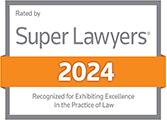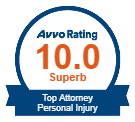 A personal injury occurs when one person, company, or another party (the defendant) negligently or intentionally breaches their duty of care toward another party (the plaintiff) and damages that party financially, physically, or otherwise.
A personal injury occurs when one person, company, or another party (the defendant) negligently or intentionally breaches their duty of care toward another party (the plaintiff) and damages that party financially, physically, or otherwise.
Common Personal Injury Claims
In Virginia personal injury cases include:
- Car, truck, and motorcycle accidents
- Slip-and-fall accidents
- Medical malpractice
- Paratransit mishaps
- Premises liability claims
- Dog bites
- Wrongful death
If you’re the victim of a personal injury caused by another party, you may seek financial compensation from the defendant for your damages: medical expenses, property damage, lost income, and pain and suffering. In most cases, the process begins with a claim against the at-fault party’s insurer, which is likely to become your adversary. Its adjusters and lawyers will look for any possible reason to deny your claim or offer you a quick, unfairly low award.
If negotiation with the insurer does not produce a reasonable settlement offer, you can file a lawsuit against the defendant and take your case to civil court. Because an insurance claim and a court proceeding are complex processes with many procedural requirements and deadlines, the services of an experienced lawyer are highly recommended to help you seek the compensation you deserve from all liable parties. The insurance company from which you’re seeking money will have a team of lawyers working to stop you from getting it, so you’re much better off with your own attorney to help you fight back and seek the justice you deserve.
What to Do After Your Accident
Whether your personal injury results from a vehicle accident, a slip-and-fall mishap, or some other event, the success of your claim depends on evidence that clearly proves the liability of the at-fault party. If you’re physically able to do so, you can begin gathering such evidence immediately after your injury by taking the following steps:
- Stay at the scene, move to a safe area, and call 9-1-1, so that police can come to make an official report, which is crucial to your claim.
- While waiting, take photographs of all vehicles and other objects involved in the event, as well as your injuries and the accident scene itself.
- Exchange contact and insurance information with the at-fault party but do not discuss the accident and do not admit any fault (full or partial) to anyone.
- Get contact information from any witnesses and note the position of nearby security or red-light cameras that might have footage of the event.
- When the police arrive, note their names and badge numbers. Answer their questions with basic information only. Do not give recorded statements to anyone.
- Inform your own insurer of the accident but do not talk to or accept offers from insurance adjusters representing the at-fault party. Instead, consult a personal injury attorney and refer all such calls and communications to your lawyer.
If you’re not transported to a hospital, you should seek medical attention as soon as possible even though you don’t feel you’re seriously hurt. Symptoms of your injuries might not surface for days after the event, but a doctor’s exam and diagnostic tests can reveal hidden medical issues and get you started sooner on the path to recovery. A prompt medical exam also provides documentation of your injuries, which is crucial to your injury claim.
Personal Injury Claims Process in Virginia
There’s no sense in filing your damage claim until you’ve completed your medical treatments and reached maximum medical improvement (MMI). Only then can your lawyer determine what your total medical expenses will be. With this information, your attorney can reasonably demand compensation from the insurance company. The insurer might then deny your claim, in which case your lawyer can move forward with a civil lawsuit. The insurer also might make you a counteroffer, and negotiations will then begin. If you’re offered a fair settlement, your lawyer will probably recommend accepting it.
If no acceptable compromise can be reached, your attorney can file a civil suit demanding that the court award reasonable compensation. Once this process begins, it’s still possible that the insurer will offer a better settlement, and the case will be resolved without actually going to court. This is what happens in most personal injury cases. Neither party wants to endure the time or expense of a trial if one can be avoided.
Have You Suffered a Personal Injury in Virginia?
Consulting an experienced personal injury attorney is your first step toward justice.
Contact us online, start a chat, or call us at 540-341-0007 to schedule your free consultation. You pay no attorney fees until we win your case.
|
Related Links: |








